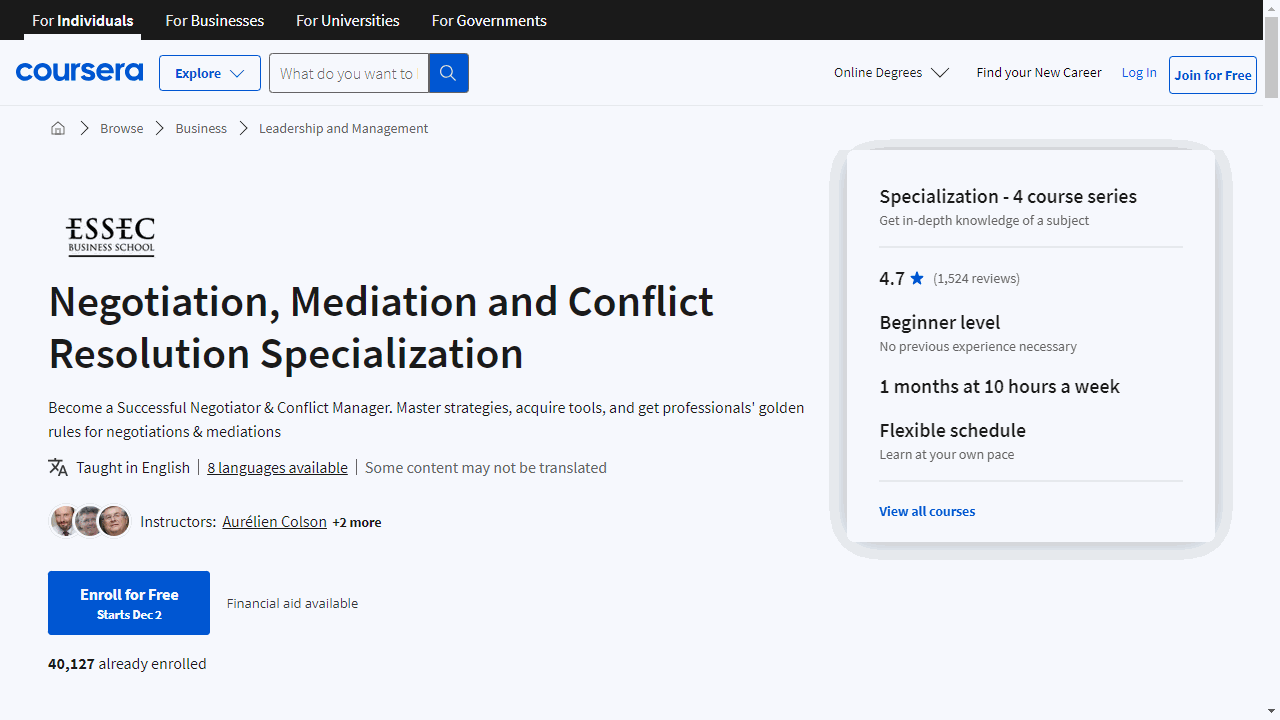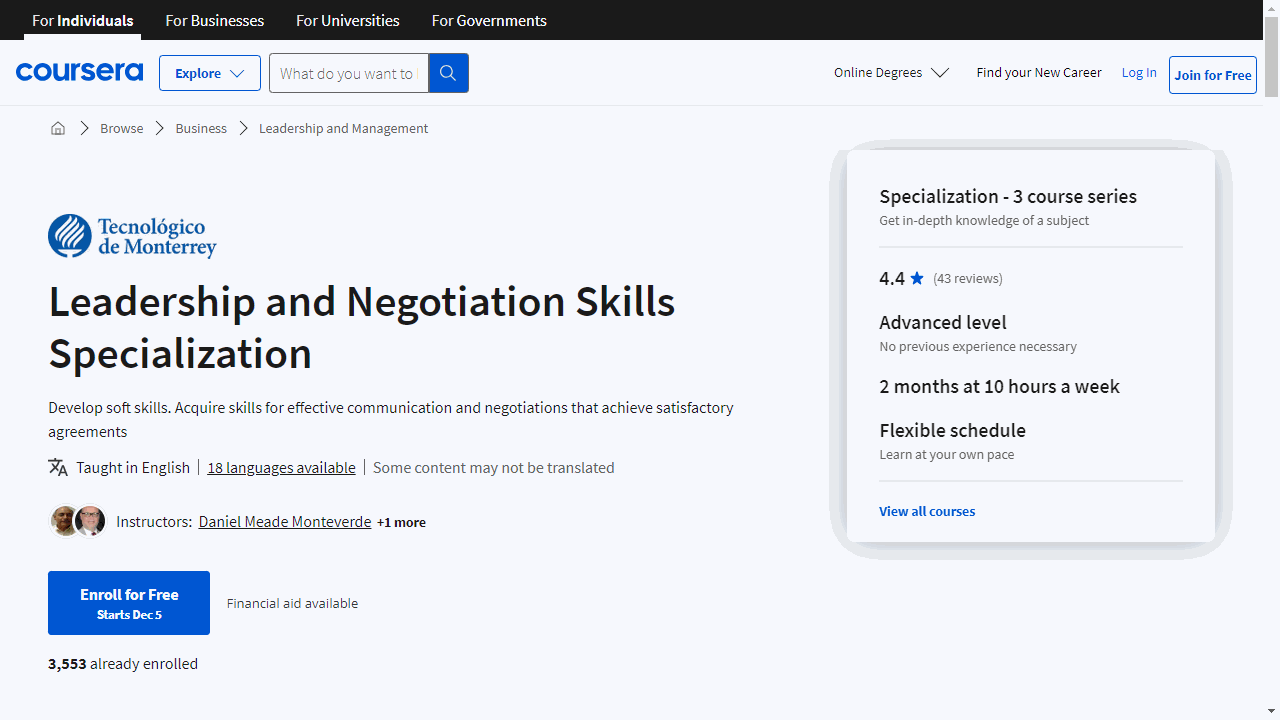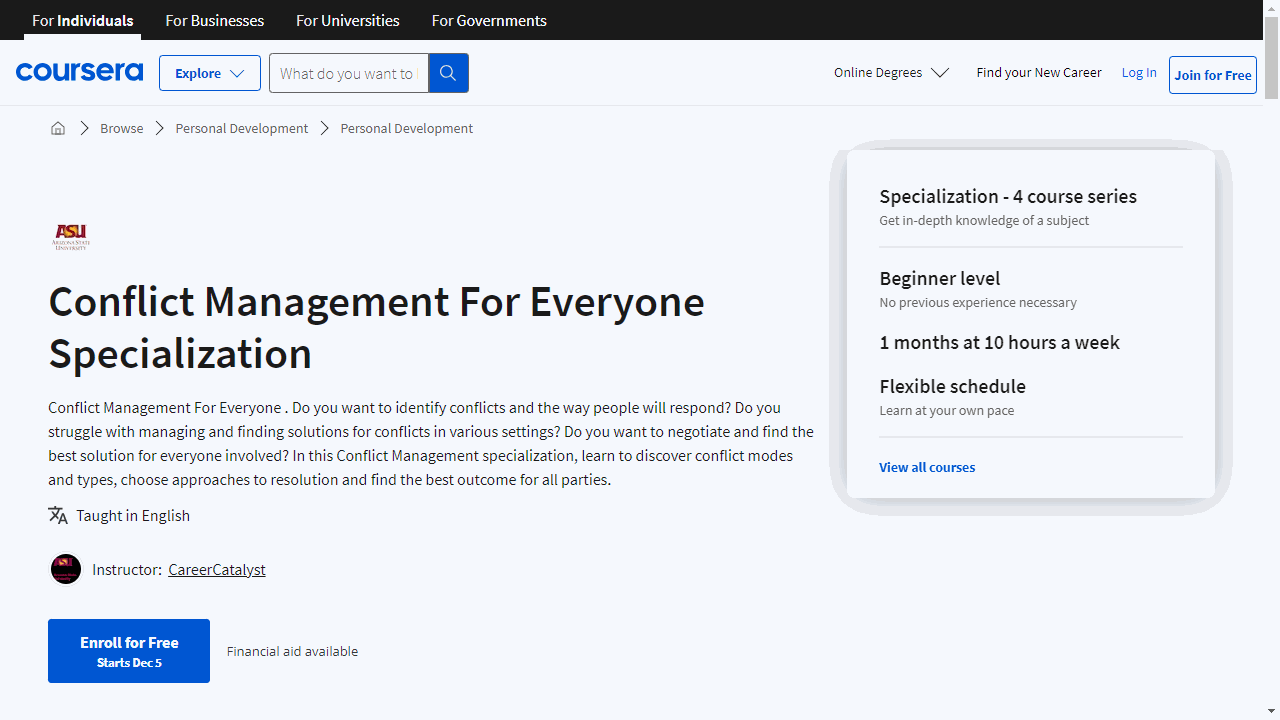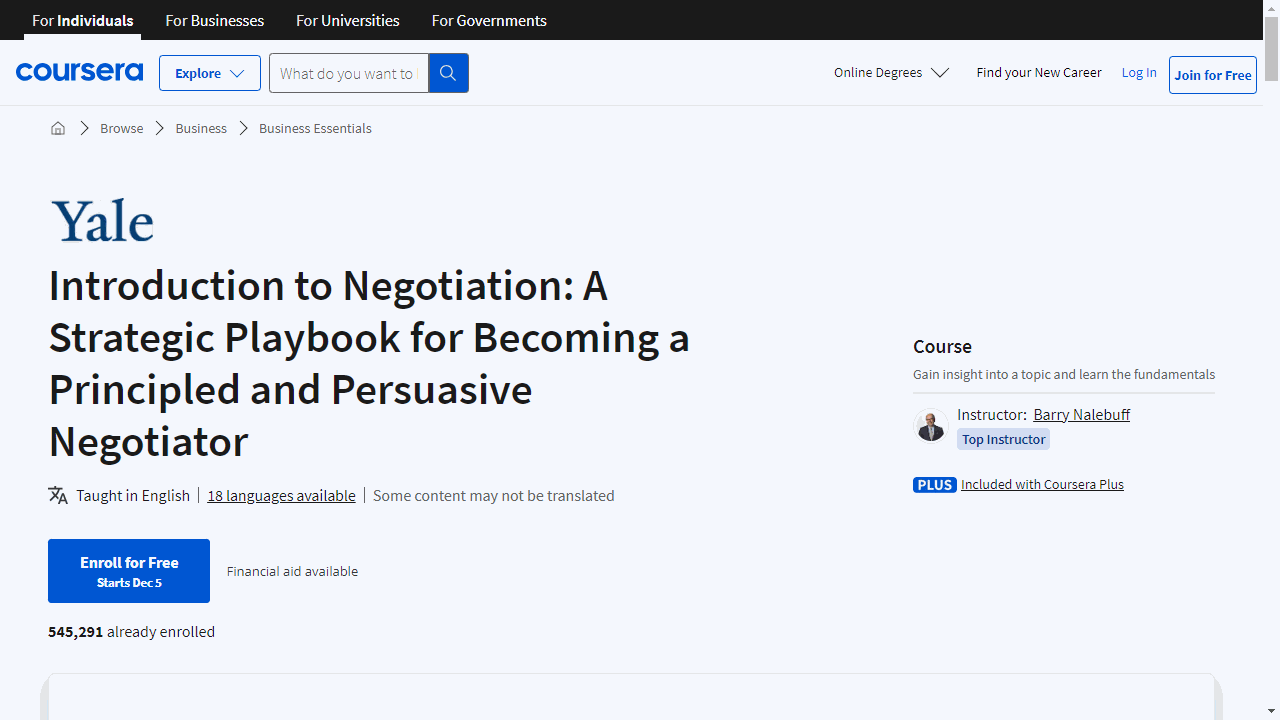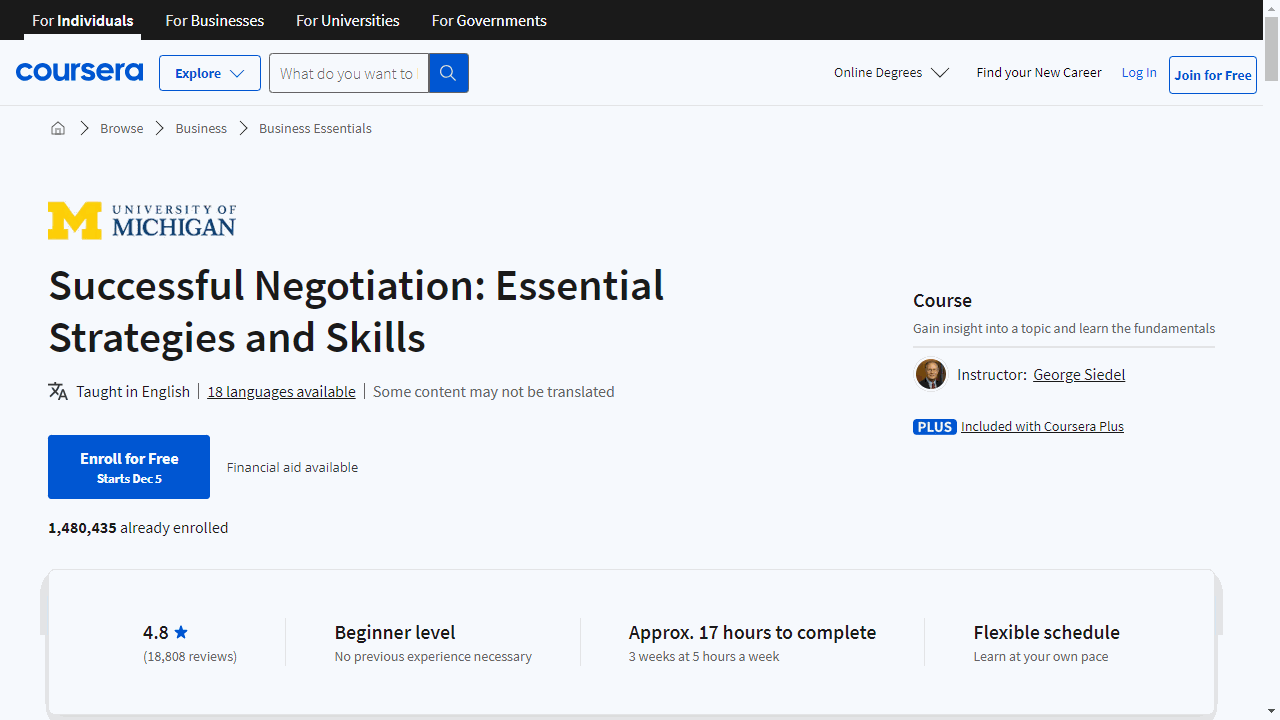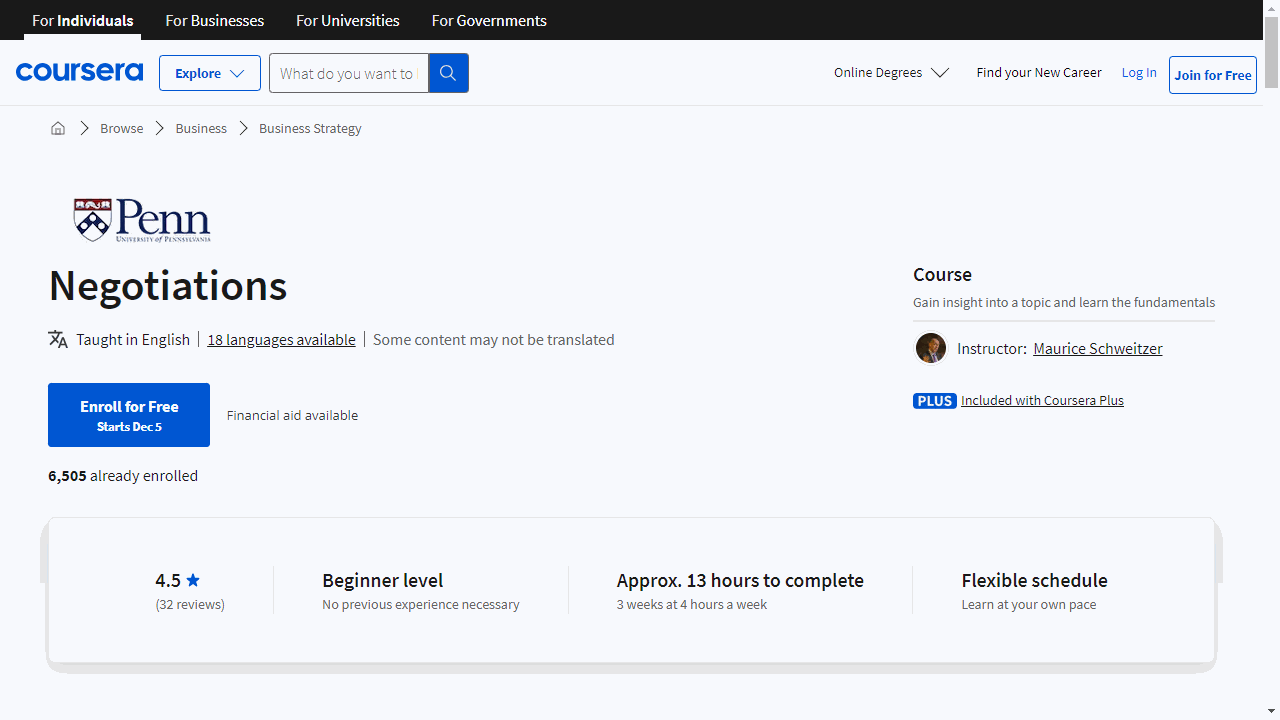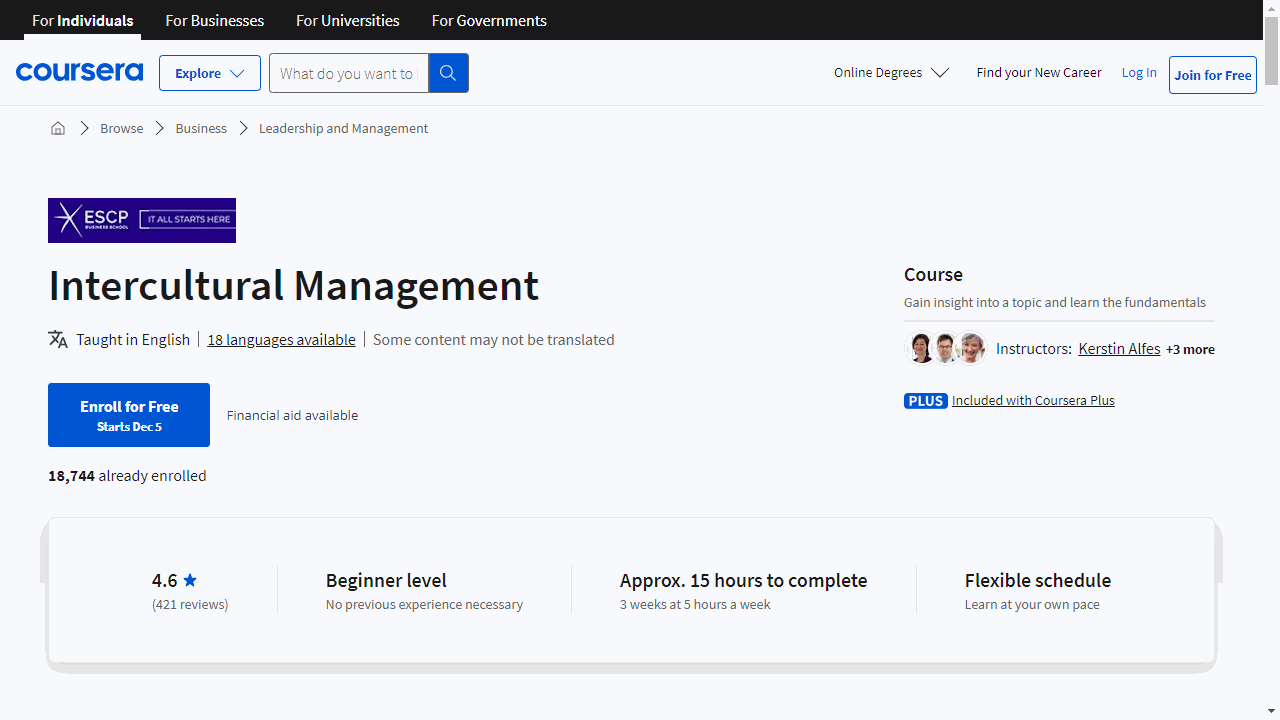Negotiation is a crucial skill in both personal and professional life.
It involves reaching mutually beneficial agreements, resolving conflicts, and achieving desired outcomes.
Learning how to negotiate effectively can empower you to confidently navigate any situation where compromise and collaboration are required.
Mastering negotiation can lead to better relationships, more favorable deals, and increased personal and professional success.
Finding a comprehensive and engaging negotiation course on Coursera can feel like a daunting task, with so many options available.
You’re looking for a program that’s taught by experienced professionals, incorporates practical exercises, and delves into the psychological aspects of negotiation.
For the best negotiation course overall on Coursera, we recommend the Negotiation, Mediation and Conflict Resolution Specialization by ESSEC Business School.
This specialization provides a well-rounded approach to negotiation, covering everything from fundamental concepts to advanced strategies.
You’ll learn to prepare effectively, identify key negotiation styles, and navigate through complex scenarios with confidence.
While this specialization stands out as a top choice, other excellent negotiation courses are available on Coursera.
Keep reading to discover more recommendations, tailored to specific interests and learning styles.
Negotiation, Mediation and Conflict Resolution Specialization
This specialization is offered by the ESSEC Business School, a top-ranked French business school.
In “Negotiation Fundamentals,” you’ll acquire practical tools to prepare for negotiations, structure effective sequences, and navigate through deadlocks.
This course emphasizes creating sustainable partnerships, moving beyond a win-lose mindset to achieve mutually beneficial outcomes.
“International and Cross-Cultural Negotiation” takes you across the globe, enhancing your understanding of cultural impacts on negotiation.
You’ll learn to recognize and adapt to cultural nuances, improving your negotiation flexibility and strategy when dealing with international partners.
“Mediation and Conflict Resolution” equips you with the skills to lead mediation processes and resolve workplace or international conflicts.
It builds on negotiation fundamentals, introducing you to various mediation types and strategies to address common challenges.
The capstone project is where theory meets practice.
You’ll analyze real-life negotiations, engage in peer negotiations, and simulate mediation scenarios.
This hands-on approach solidifies your learning and prepares you for real-world application.
Each course is rich with expert videos, interactive content, and practical case studies, ensuring a comprehensive learning experience.
Leadership and Negotiation Skills Specialization
This specialization is offered by Tecnológico de Monterrey.
In “Effective Communication for Today’s Leader,” you’ll grasp the essentials of assertive and empathetic communication, crucial for any leader.
You’ll learn to apply these skills to foster a positive work environment and to meet organizational objectives effectively.
Moving on to “Negotiation Skills and Effective Communication,” this course equips you with cutting-edge negotiation techniques.
You’ll learn to manage emotions with emotional intelligence and implement key negotiation styles to reach beneficial agreements.
Finally, “Negotiation Strategies and Styles” introduces you to the negotiator’s dilemma, teaching you to discern the best strategy for cooperation or competition.
You’ll identify your negotiation style, analyze strategic options, and tackle complex problems, ensuring both value creation and satisfaction in your negotiations.
Conflict Management For Everyone Specialization
This specialization is offered by Arizona State University.
Each course is tailored to equip you with specific skills to navigate and resolve conflicts effectively.
In “Assessing Conflict,” you’ll learn to spot conflicts early and understand various reactions.
Skills like active listening and strategic questioning will help you pinpoint the heart of conflicts, setting the stage for resolution.
“Managing Conflict” offers strategies for addressing disputes across different communication channels.
You’ll learn to adjust your conflict mindset and tackle confrontations whether they occur face-to-face, on a call, or through email.
The “Negotiation” course sharpens your preparation and strategy for negotiations.
You’ll gain insights into crafting offers and counteroffers, ensuring you can navigate negotiations toward mutually beneficial outcomes.
Lastly, “Resolving and Transforming Conflict” focuses on creating and implementing lasting solutions.
It teaches you to approach conflicts cooperatively and respond effectively, ensuring that resolutions stick.
By diving into these courses, you’ll develop a robust set of skills for managing and resolving conflicts in any area of your life.
Introduction to Negotiation: A Strategic Playbook for Becoming a Principled and Persuasive Negotiator
This course by Yale University takes you from the foundational concepts to advanced negotiation strategies.
You’ll start by learning about “the Pie,” which is key to understanding what’s at stake in any negotiation.
Through engaging examples, like splitting a limo fare or historical anecdotes, you’ll see how to identify and expand the resources available for division.
The course introduces you to problem-solving tools like the Shapley Value, helping you ensure fair outcomes.
While there’s some math involved, you’re given a heads-up, allowing you to prepare or opt-out as needed.
Practical exercises are central to the curriculum.
You’ll engage in the Ultimatum Game to witness negotiation dynamics firsthand and explore BATNA to determine your walk-away point.
The concept of ZOPA will also be a focus, teaching you to identify the range where agreements can be reached.
Real-world simulations, such as the Zincit case, provide hands-on experience.
You’ll negotiate, record, and analyze your discussions, gaining insights into effective strategies and common pitfalls.
The course also addresses the nuances of negotiation, including how to manage deception and maintain control.
You’ll learn the power of strategic silence and how to navigate complex scenarios like real estate transactions or salary discussions.
Special attention is given to negotiation challenges unique to women, offering strategies to boost confidence and effectiveness.
Interactive webinars complement the course material, allowing you to clarify doubts and learn from peers.
Successful Negotiation: Essential Strategies and Skills
This course from University of Michigan focuses on the know-how to navigate various negotiation scenarios, whether resolving disputes or sealing deals.
You’ll start by understanding when to negotiate and the difference between position-based and interest-based negotiation.
Crucially, you’ll learn about BATNA, a key concept that helps you make informed decisions when the stakes are high.
The course emphasizes the importance of understanding your counterpart.
You’ll explore how to use power effectively and apply psychological tools to avoid common negotiation pitfalls like overconfidence and the mythical fixed pie assumption.
Building your negotiation power is central to the course.
You’ll delve into contract law, learning the essentials of creating agreements that align with both business and legal objectives.
This knowledge is vital for ensuring successful outcomes post-negotiation.
Hands-on experiences are a highlight.
You’ll engage in an interactive negotiation with investors, applying your skills in a dynamic setting.
This practical approach ensures you’re not just learning theory but also honing your skills in real-time.
As you progress, you’ll be supported by a wealth of resources, including suggested readings and checklists.
The course culminates in a final exam, allowing you to demonstrate your newfound expertise.
Wharton’s Negotiations
This course from University of Pennsylvania teaches you negotiation tactics, strategies for preparation, and the ability to manage the psychological and emotional aspects of negotiating.
You’ll begin by mastering negotiation stages and thorough preparation techniques, ensuring you enter any negotiation with a solid foundation.
The course emphasizes the importance of preparation with dedicated sessions to build your strategy.
As you progress, you’ll learn the art of exchanging information and offers effectively.
This is crucial for advancing negotiations and crafting deals that benefit all parties involved.
Closing negotiations successfully is an art in itself, and you’ll practice this skill extensively.
You’ll also engage in active listening exercises, enhancing your ability to understand and respond to your counterpart’s needs and positions.
The course includes practical components, such as writing up negotiation scenarios, which allow you to apply what you’ve learned in real-world contexts.
You’ll also delve into the psychological aspects of negotiation, exploring implicit beliefs and the concept of the zone of agreement to find common ground more easily.
Understanding the differences in negotiating for goods versus services, leveraging your position, and creating value in negotiations are also covered.
You’ll learn to navigate these nuances with ease.
Effective questioning techniques are a highlight of the course, teaching you to ask and answer questions in ways that reveal valuable information and maintain control during negotiations.
For those interested in employment negotiations, the course offers specialized content to help you navigate job offers and contracts.
The curriculum also tackles the ethical side of negotiations, including how to detect and avoid deception, establishing trust, and managing time pressure and threats.
Emotional intelligence is another key focus.
You’ll learn strategies for regulating emotions, dealing with anxiety and anger, and even using humor to defuse tension and build rapport.
Intercultural Management
This course from ESCP Business School enhances your negotiation skills through the lens of cultural understanding, crucial for international business dealings.
The course kicks off with an exploration of globalization’s impact on culture, introducing you to the concept of cultural dimensions.
Understanding these dimensions is vital—they’re the foundation for recognizing how different cultures negotiate and conduct business.
You’ll then sharpen your intercultural management skills, learning to lead diverse teams and adapt to global cultural trends.
The curriculum is diverse, featuring textbooks, scholarly articles, and a TED Talk that illustrates the economic influence of global money transfers.
Self-awareness is a key theme, and you’ll engage in reflective exercises like the Autobiography of Intercultural Encounters to better understand your cultural biases and improve your ability to manage cross-cultural teams.
The course also covers practical aspects of international human resource management, including culturally sensitive recruitment and reward systems.
This knowledge is essential for motivating a global workforce.
When it comes to negotiation, you’ll delve into various strategies and the significance of language styles, such as high-context versus low-context communication.
This understanding is crucial for effective deal-making across cultures.
Finally, you’ll gain insights into international marketing strategies, learning to make informed decisions about products, promotions, placements, and pricing on a global scale.
